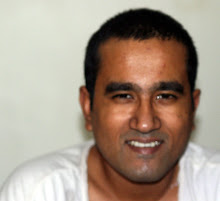There is a low murmur around Chennai’s theatre groups – a grouse that dare note speak its name. Theatre regulars would know that the Hindu Theatre Fest started off as an event primarily supported by local groups. Last year, the event shifted its venue to the Academy, and its focus to national troupes. The stage was still larger this year with some international groups taking part, while local groups were pushed to weekday performances, diplomatically dubbed as “the Chennai Chapter” in the smaller Sivagami Pettachi auditorium. I suppose the cash strapped theatre scene in Chennai had little choice but to accept what was thrown its way.
Not an entirely negative development in the end. The Sivagami Pettachi hall is a cozy little place which is far more comfortable than the Academy besides which, the acoustics are a lot less unpredictable. And despite the inconvenience of the timing, the few shows that I caught were all sold out.
The first of these was directed by Samanth Subramanian, a debutant director and a peddler of several talents which include, besides occasional daubs of greasepaint, writing and quizzing (one of the members of the Landmark quiz winning QED mentioned below).
Scripted by Ariel Dorfman, the play explores the festering wounds of the Pinochet dictatorship through the torment of a woman (Paulina – Sunanda Raghunath) who thinks she has found the man who’d raped and tortured her during the regime. The accused (Dr. Miranda – Samanth Subramanian) intermittently protests his innocence to the extent he can make himself intelligible through his panty-gagged mouth. Paulina’s husband (Gerardo, played very effectively by Freddy Koikkaran), is a lawyer who lurches between shocked disbelief at his wife’s dementia and his concerns about apostatizing his passionate belief in the law.
The material was powerful, shocking and for Chennai’s conservative audience, rather scandalous. Despite being inured to the bohemianism of theatre folk I found myself squirming and fidgeting when Sunandha did a toned down (mercifully!) re-take of Sharon Stone in Basic Instinct! However, while her courage in taking up the role deserves appreciation, her tedious monologues, delivered in a drawling Tamil accent, only served to expose the geographical incongruity of the play’s setting.
Nevertheless, the strength of the script, some imaginative lighting and an inspired performance from Koikkaran (ably supported in the final stages by Samanth) prevented the play from descending into the sort of melodrama one normally associates with vernacular theatre in the city. The ending resolved the symbolic undercurrents into some stark and poignant questions about the pains of revolution and the insatiable, yet directionless, nature of vengeance…the gentleman sitting next to me, however, did not share my enthusiasm for it – he insisted on my providing a“JPH notes” style explanation of the conclusion!
 A Landmark and a Quiz
A Landmark and a Quiz“Shashtiabdhapoorthi” is how many a Mylapore mama with a predilection for drawing spiritual parallels chose to put it. Sixty years it’s been, sure, but I find the analogy misplaced. For the typical South Indian, the completion of 60 years signals the commencement of vanaprastha (even if it is in the concrete jungle these days!) – a time for retirement, contemplation and detachment. Hardly describes what’s going on in our country right now. It doesn’t get more materialistic or frenetic than this! "Sixty years young" is then, my clichéd take….
The media enthusiastically joined in the festivities, thankfully leaving Sanjay Dutt to his devices (pardon the unkind pun!) for a day or two. The Hindu, which had managed to keep Mr. Dutt within the confines (apologies repeated!) of the middle pages for the better part of his ordeal, expectedly put out the best tribute, adorned with a bouquet of priceless photographs.
But experiencing the wonder of India does not necessarily entail a collective wallowing in the past. While reminiscing about the lions of the freedom struggle is certainly a good way of working up the goosebumps, an equally effective method is to witness the miracles that our country serves up everyday, none of which is more heartening than the intellectual firepower of our young men and women. Here, more than anywhere else, the optimist likes to believe, resides our country..
My annual participation in the Landmark quiz has, therefore, less to do with hopes of covering myself with glory – the result is usually quite the opposite – than the reaffirmation of my faith in the spectacular repository of grey cells that is India. There was some vicarious pleasure as well – of the winning team’s (QED – which is threatening to become the Roger Federer of Chennai quizzing, having won the quiz last year as well) three members, one was a friend and another, a colleague…
Quizzing does not throw up too many stars but sometimes even the most exquisite leg glance (leave alone, the garish histrionics of Bollywood) pales in comparison to a solution stitched together from the slenderest threads of association between seemingly nonsensical bits of trivia– some of it is positively Freudian. These guys deserve much more than Rs. 40,000 in Landmark gift vouchers....
Happy 60th/6000th birthday India! Here's wishing you many more miracles!

